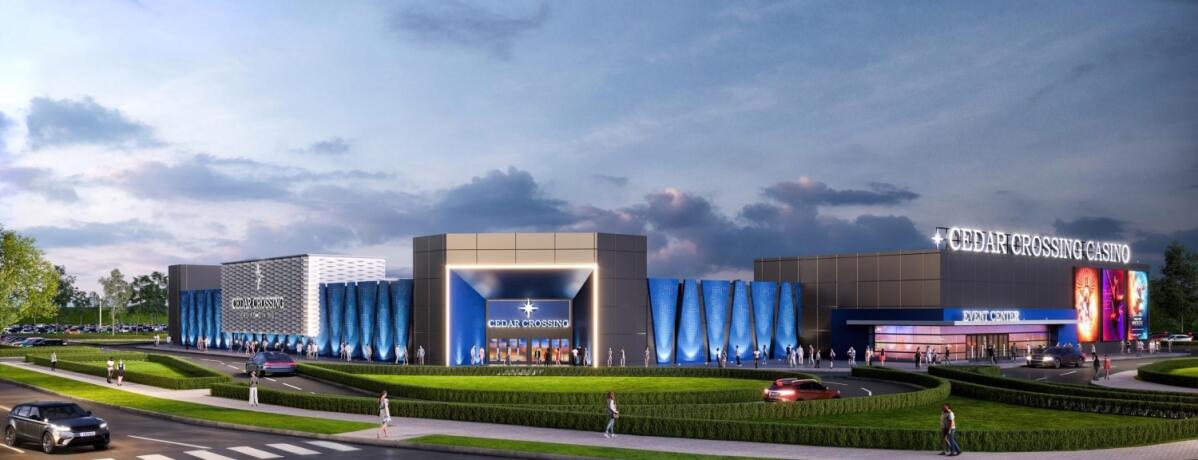The Gazette offers audio versions of articles using Instaread. Some words may be mispronounced.
Opponents to gambling expansion in Iowa have launched a public relations and legal campaign to stop a proposed casino from coming to Cedar Rapids.
Riverside Casino & Golf Resort and the Washington County Riverboat Foundation, the nonprofit affiliate and gaming license holder for Riverside Casino, have petitioned the Iowa Racing and Gaming Commission for a declaratory order stating it lacks authority to issue a new license for a Cedar Rapids casino. They also have requested the commission stay any decision on a Linn County casino license while it considers the petition.
In 2013 and 2021, Linn County residents passed public referendums authorizing gaming in the county. The 2021 vote permanently authorizes gaming in the county.
Des Moines attorney Mark Weinhardt, on behalf Riverside Casino and its nonprofit affiliate, contends the 2021 ballot measure approved by Linn County voters contained outdated language that failed to comply with Iowa Code.
Weinhardt, in his petition to the state gaming commission, argues the 2021 public measure approved by Linn County voters only sought approval of the continuation of a subset of gambling games, and does not constitute approval of new gaming.
Download: Petition for Declaratory Order to IRGC.pdf
The ballot measure stated: “If approved by a majority of voters, operation of gambling games with no wager or loss limits may continue.” The state, though, has never licensed gambling games in Linn County, which Iowa Code defines as including games “with and without wager or loss limits.”
“A proposition requiring approval or defeat of the continuation of gambling games is not a proposition that authorizes the origination of gambling games in the county,” according to the petition. “ … And because there has not been compliance with Iowa Code 99F.7, the IRGC is prohibited from issuing any license for gambling games in Linn County.”
Anne Parmley is president of the Linn County Gaming Association, the charitable arm of the Cedar Rapids Development Group, the proposed developers of the Cedar Crossing Casino.
Parmley and other backers of the proposed Cedar Rapids casino decried the petition as a delay tactic to prevent Linn County from benefiting from a gaming operation, which would support the city and county through taxes and betterment funds, and provide $6.3 million annually to nonprofits.
“I’m confident, based on the information that I’ve been given, that Linn County voters voted favorably towards gaming in Linn County in the way that they should have,” Parmley said.
Commission meets Wednesday to hear comments
Iowa Racing and Gaming Commission members will consider the petition and request to stay a decision on a Cedar Rapids casino license at its Thursday meeting at Catfish Bend Casino in Burlington.
Dan Kehl, chief executive officer of Elite Casino Resorts — the company that operates Riverside Casino as well as Rhythm City Casino Resort in Davenport — and Patty Koller, executive director of the Washington County Riverboat Foundation, declined to comment ahead of the IRGC meeting.
Before that, the commission will meet Wednesday in Cedar Rapids to visit the site of the proposed casino, and to hold a public hearing on the application for a gaming license.
California-based Peninsula Pacific Entertainment (P2E), the proposed developer of Cedar Crossing, and the Linn County Gaming Association formally presented plans last month to the state gaming agency for its proposed $275 million development that would be built on the former Cooper’s Mill site, on Cedar Rapids’ northwest side. Plans call for a casino with 700 slot machines and 22 table games, plus a group of restaurants, bars, a 1,500-seat entertainment venue, an arts and cultural center and a STEM lab for families.
The state commission has twice rejected proposals — in 2014 and 2017 — to bring a casino to Cedar Rapids. At the time, commissioners cited concerns that a new facility would cannibalize revenues from other Iowa casinos and dilute, rather than increase, the state’s gambling market.
The state later implemented a two-year moratorium on new gaming licenses that expired July 1. Lawmakers have said they intend to file a casino moratorium bill that would block new gaming licenses when the Iowa Legislature convenes Jan. 13.
The commission expects to vote on granting a license at its Feb. 6 meeting, giving lawmakers little time — roughly 18 days — to pass and have Gov. Kim Reynolds sign the casino license prohibition. Should the state gaming commission approve the casino license before Reynolds signs a moratorium into law, the license would remain valid.
Casino backers say the state’s second-largest city should be allowed to benefit from gaming the same as other Iowa communities, and that growth in Iowa’s gaming industry and competition from neighboring states could make Cedar Crossing more relevant and needed.
A study commissioned by P2E and conducted by Convergence Strategy Group suggests a Cedar Rapids casino could increase Iowa’s net gaming revenues by more than $80 million annually.
Overall, nearly 26 percent of revenue generated by a Cedar Rapids casino is anticipated to come from existing Iowa operators. Supporters argued that’s significantly less than what was projected when the state granted licenses for Grand Falls Casino Resort in Larchwood and Wild Rose Hotel & Casino in Jefferson, and outweighed by the overall gaming revenue benefit.
Riverside Casino would see the largest impact with an 11.6 percent drop in gaming revenue. Waterloo’s Isle Casino would lose a projected 5.8 percent while Dubuque’s two casinos would lose 3.6 percent of revenue to a Cedar Rapids casino, according to the study.
The Iowa Racing and Gaming Commission in August selected two vendors to complete its own market study analyses on the potential impacts of a new casino in Cedar Rapids. Those studies are due at the end of December and will be publicly presented at the commission’s January meeting.
Group launches ad, online petition supporting casino moratorium
Iowans for Common Sense, which promotes itself as a grassroots coalition, has launched a YouTube ad claiming Iowans support casino gambling, but do not support adding more casinos. It asks Iowans to oppose the casino, inviting residents to sign a petition supporting a statewide moratorium on new casinos.
“We don’t need another casino in Iowa,” Koller, executive director of the Washington County Riverboat Foundation and a supporter of Iowans for Common Sense, said in a statement on the group’s website. “If Cedar Rapids is granted a license, it would harm surrounding casinos and the nonprofits that rely on them. These nonprofits have poured millions into the corridor, benefiting communities far beyond their borders. As an organization rooted in rural Iowa, we are proud to support our corridor and our rural neighbors, who would undoubtedly be impacted by this proposed development.”
Cedar Rapids Mayor Tiffany O’Donnell questioned the true grassroots nature of the effort and suspects Iowa casino operators are behind it.
“Iowa casino operators, who’ve enjoyed record profits, are financing both the ad campaign and the legal team who has a singular goal — and that’s to unfairly influence Iowa Racing and Gaming commissioners,” O’Donnell told The Gazette. “And, you know, those of us here in Cedar Rapids and Linn County trust the process and have every confidence in the commissioners to look at the data and make the right decision for Iowans.
“I think it’s extremely distasteful that you have, you know, hundreds of thousands of dollars being thrown in a campaign meant to circumvent the will of Linn County voters,” she continued. “And I believe Linn County residents see it for what it is, and I believe that the Iowa Racing and Gaming Commission will see it for what it is as well.”
Parmley emphasized the importance of a casino in helping nonprofits like Four Oaks, Eastern Iowa Health Center and others meet unmet needs in areas like homelessness, food insecurity and health care. She said the organizations serve a wider area beyond just Linn County, and would greatly benefit from the influx of funding that the casino could provide to expand their work.
Peninsula Pacific Entertainment and the Linn County Gaming Association have committed to distributing 8 percent of net adjusted gross revenue to nonprofit organizations, or about $6.3 million annually — more than twice the state-mandated minimum. Of that, Parmley said a minimum of 10 percent will be distributed to nonprofits in adjacent counties.
She and O’Donnell said casino backers expect legitimate opposition but also support from community leaders and nonprofit organizations at the upcoming site visit and public hearing.
“I look forward to having them here to showing them not just the property where this casino will sit, but also encouraging them to talk to residents — to hear why this was so important for voters to two times approve this opportunity,” O’Donnell said.
Comments: (319) 398-8499; tom.barton@thegazette.com





